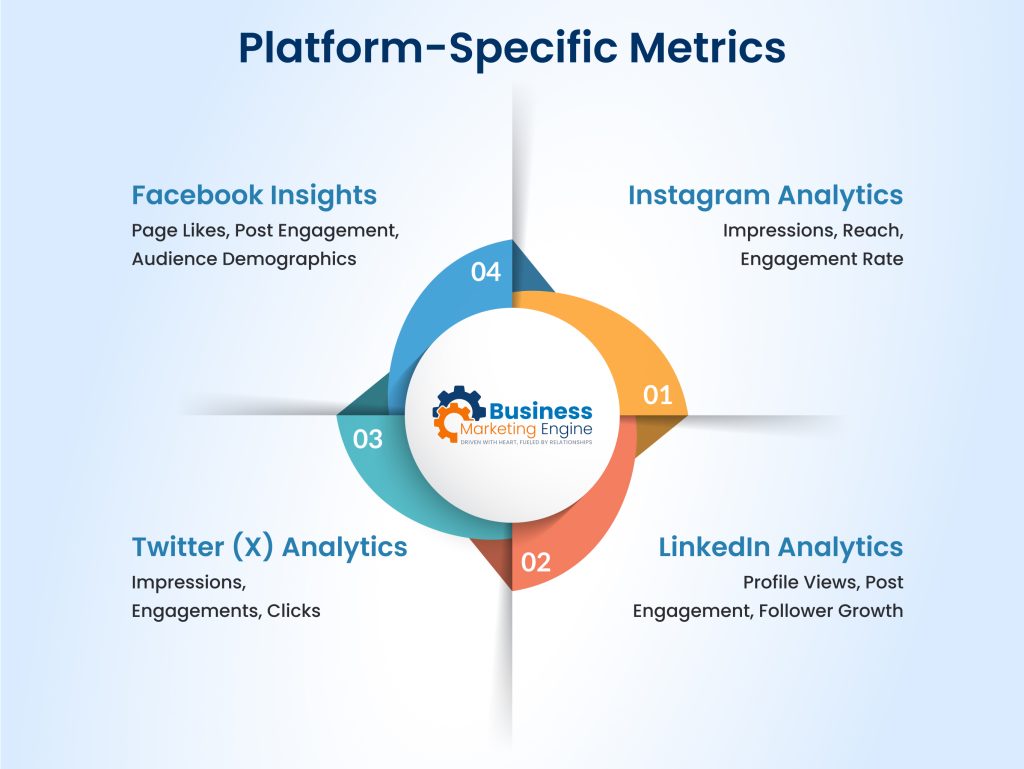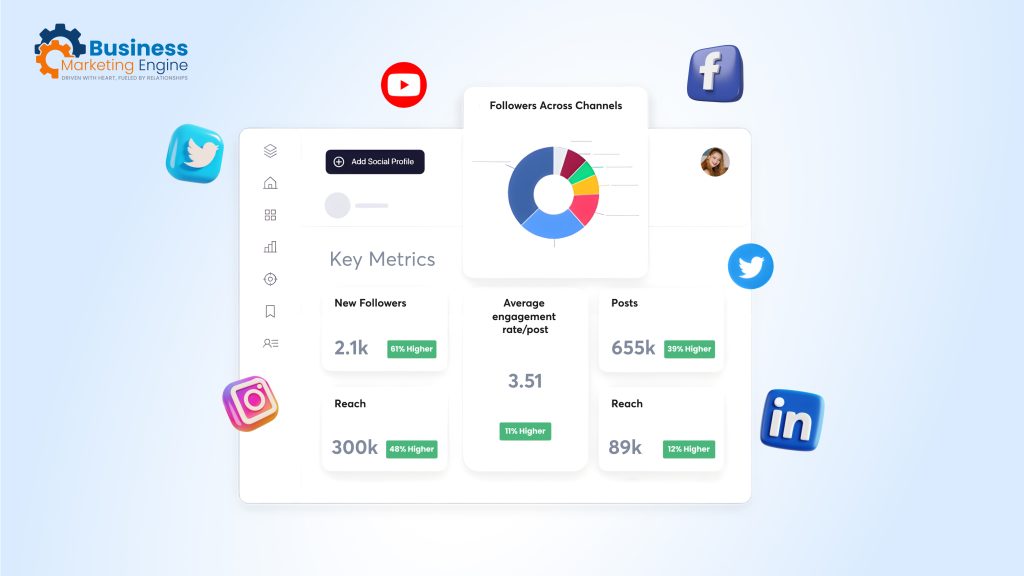In today’s digital age, social media has become an essential marketing tool for businesses of all sizes.
However, it’s not enough to simply be active on social media platforms. You need to track and analyze your social media metrics to measure your success and identify areas for improvement.
By understanding some key social media metrics, you can gain valuable insights into your audience, refine your content strategy, and maximize your ROI.
In this blog post, we’ll discuss the most important social media metrics to track and how to use them to improve your results. By the end, you’ll have a clear understanding of the metrics that matter most for measuring content success and how to use them to make data-driven decisions.
Identifying Key Performance Indicators (KPIs) for Your Goals
To effectively measure the success of your social media content, it’s essential to identify the key performance indicators (KPIs) that align with your overall business goals.
Engagement Metrics
Engagement social media metrics provide insights into how your audience is interacting with your content. Some of the most common engagement metrics include:
- Likes: Indicates the number of people who have positively reacted to your content.
- Comments: Shows the level of discussion and engagement your content has generated.
- Shares: Measures how many people have shared your content with their network.
Reach and Impressions
Reach and impressions measure the visibility of your content.
- Reach: Indicates the number of unique users who have seen your content.
- Impressions: Shows the total number of times your content has been viewed, including multiple views by the same user.
Click-Through Rates
CTRs measure how effective your content is at driving traffic to your website or landing page.
- CTR: Calculated by dividing the number of clicks on a link by the number of impressions.
Leads
If your goal is to generate leads through social media, track the number of leads generated from your social media efforts. This can include sign-ups for your newsletter, contact form submissions, or direct messages.
Platform-Specific Metrics
Each social media platform offers its own set of analytics tools that provide valuable insights into your content performance.
Facebook Insights
Facebook Insights provides a comprehensive suite of analytics tools for your Facebook page. Some key metrics to track include:
- Page Likes: The number of people who have liked your page.
- Post Engagement: Likes, comments, shares, and clicks on your posts.
- Audience Demographics: Information about your audience’s age, gender, location, and interests.
Instagram Analytics
Instagram Analytics offers insights into your Instagram account’s performance. Some important metrics to track include:
- Impressions: The total number of times your content has been seen.
- Reach: The number of unique accounts that have seen your content.
- Engagement Rate: The percentage of your followers who have engaged with your content.
Twitter (X) Analytics
Twitter (X) Analytics provides data on your account’s performance. Key metrics to track include:
- Impressions: The number of times your tweets have been seen.
- Engagements: The total number of times your tweets have been retweeted, liked, or replied to.
- Clicks: The number of clicks on links in your tweets.
LinkedIn Analytics
LinkedIn Analytics offers insights into your LinkedIn profile and company page performance. Some important metrics to track include:
- Profile Views: The number of times your profile has been viewed.
- Post Engagement: Likes, comments, shares, and clicks on your posts.
- Follower Growth: The rate at which you’re gaining followers.
Tracking Reach and Visibility Metrics
Reach and visibility social media metrics, such as impressions, provide insights into how many people are seeing your content and how well it’s performing in terms of discoverability.
Track these social media metrics to identify which types of content are performing best in terms of reach and visibility. You can also use this data to optimize your content strategy and make your posts more discoverable.
Evaluating Engagement Metrics
Engagement social media metrics provide insights into how your audience is interacting with your content. By tracking metrics like likes, comments, shares, and saves, you can identify which types of content are resonating with your audience.
Analyze which content formats and topics generate the most engagement. This ensures you can tailor your content strategy to create posts that resonate with your audience.
Monitoring Click-Through Rates (CTRs) and Conversions
Click-through rates (CTRs) and conversions are important social media metrics to track if your goal is to drive traffic to your website or landing pages and generate leads or sales.
To analyze which content types lead to the most conversions, experiment with different types of content and track their performance. You can also use A/B testing to compare different versions of the same content and determine which one performs better.
Utilizing Social Media Analytics Tools
Most social media platforms offer built-in analytics dashboards that provide valuable insights into your content performance. However, for deeper insights and more comprehensive analysis, you may want to consider using third-party social media analytics tools.
Benefits of using third-party social media analytics tools include:
- Cross-platform reporting: Track the performance of your content across multiple platforms from a single dashboard.
- Advanced features: Access advanced features like competitor analysis, influencer marketing tracking, and sentiment analysis.
- Data visualization: Visualize your data in easy-to-understand charts and graphs.
By utilizing both built-in analytics tools and third-party social media analytics tools, you can gain a deeper understanding of your content performance and make data-driven decisions to improve your results.
Analyzing Data Over Time and Identifying Trends
To gain valuable insights into your social media performance, it’s essential to track your data over time and identify trends. By analyzing your data over a period, you can identify patterns, measure the effectiveness of your content strategy, and make data-driven decisions to optimize your results.
Here’s how you can use data to adapt your strategy:
- Identify what resonates: Analyze which types of content, topics, and formats resonate best with your audience.
- Optimize your approach: Use your insights to refine your content strategy, improve your posting schedule, and experiment with different approaches.
- Measure the impact of changes: Track the performance of your changes over time to assess their effectiveness.
By analyzing your data over time and identifying trends, you can make informed decisions to optimize your social media strategy and achieve your marketing goals.
Conclusion
By effectively tracking and analyzing social media metrics, you can gain valuable insights into your audience, refine your content strategy, and maximize your ROI. Remember to identify the most essential KPIs, evaluate engagement, and utilize analytics tools.
Tired of guessing what’s working on social media? Let our marketing experts help you uncover the data-driven insights you need to succeed. Chat with our team today!






